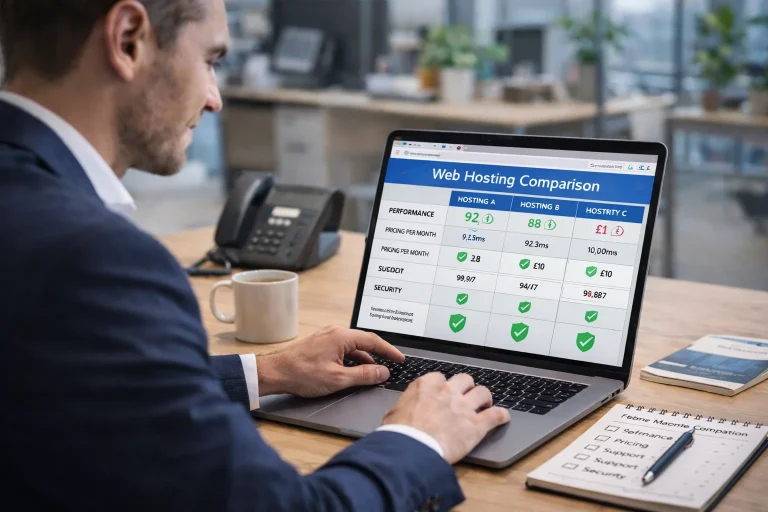Have you ever wondered what might happen if someone slipped and fell at your business premises, or if you accidentally damaged a client’s property while on the job?
These situations could lead to expensive legal claims and financial loss, which is where public liability insurance comes into play. This essential type of cover is a vital safety net for small businesses, protecting them from the unexpected costs associated with third-party injuries and property damage.
Operating a business in the UK means facing a variety of risks, whether you run a cosy shop, a growing consultancy, or a bustling events company. Even the most cautious businesses can encounter accidents that lead to hefty compensation claims.
Public liability insurance provides peace of mind, allowing you to focus on running your business without constantly worrying about potential lawsuits. Let us explore what public liability insurance is, why it is crucial, and how you can choose the best cover for your business needs.
What Is Public Liability Insurance for Small Businesses?

Public liability insurance for small businesses is a policy that protects you if a third party, such as a customer, supplier, or member of the public, suffers an injury or property damage because of your business activities.
Whether you work from home, run a shop, or visit client locations, accidents can happen at any time. Having the right insurance ensures you are covered for legal fees, compensation payments, and repair costs resulting from claims.
This insurance is not legally required in the UK, but it is strongly recommended for businesses that interact with the public. In some cases, clients or councils may even insist on seeing proof of public liability insurance before they agree to work with you. Without this protection, a single incident could be enough to threaten the financial stability of your business.
Public liability insurance typically covers claims made against your business on your premises, at a client’s location, or elsewhere. It is a cornerstone of responsible business ownership and demonstrates your commitment to safety and professionalism.
Why Do Small Businesses in the UK Need Public Liability Insurance?
Small businesses often operate with tight margins and limited resources, making them particularly vulnerable to unexpected expenses. If a member of the public were injured or their property damaged because of your business, you could face substantial legal costs and compensation demands. Public liability insurance acts as a financial shield against these claims.
Clients, event organisers, and even local councils may require you to have this cover before engaging your services. It serves as a reassurance that your business is prepared for unexpected incidents. Without it, you could lose valuable contracts and opportunities that demand proof of insurance.
Furthermore, public liability insurance supports your business reputation. By having cover in place, you show potential clients and partners that you take safety and accountability seriously. It builds trust and positions you as a responsible business owner who is prepared to manage risks professionally.
What Does Public Liability Insurance Typically Cover?
Public liability insurance typically provides a wide range of cover designed to protect your business from third-party claims. Here is a breakdown of what it usually includes:
- Compensation claims: Covers legal costs and compensation if someone suffers personal injury or financial loss because of your business.
- Accidental damage to third-party property: If your business activities accidentally damage client or public property, the insurance covers repair or replacement costs.
- Medical expenses: Pays for medical treatment needed due to an injury caused by your business operations.
- Injury or death: Covers costs arising if someone is seriously injured or killed because of your work activities.
- Product liability: Protection if a product you supply, manufacture, or sell causes harm or damage.
Having comprehensive public liability insurance ensures that you are financially protected against a broad spectrum of risks your small business might face daily.
What Does Public Liability Insurance Not Cover?

While public liability insurance provides extensive protection, there are important exclusions that every small business should understand. Recognising these gaps helps ensure you have the right additional cover in place to fully protect your business.
| Not Covered | Explanation |
| Employee Injuries | Claims from employees who are injured or fall ill at work are covered by employers’ liability insurance, not public liability insurance. |
| Damage to Your Own Property | Public liability insurance only covers third-party property damage, not damage to your business premises, stock, or equipment. |
| Professional Mistakes | Errors in advice, services, or designs causing client financial loss require professional indemnity insurance for cover. |
| Intentional Damage | Deliberate harm caused by you or your employees is excluded from public liability insurance claims. |
| Fines and Penalties | Legal fines, penalties, or regulatory breaches are not covered by public liability insurance and must be managed separately. |
By understanding these exclusions clearly, you can manage your insurance expectations properly and identify when extra types of insurance, such as employers’ liability or professional indemnity cover, might be necessary to complete your protection.
How Much Public Liability Insurance Do Small Businesses Need?
Choosing the right amount of public liability insurance for your small business is crucial. The amount you require depends on various factors, including the nature of your work, the level of public interaction, and any client requirements. Generally, small businesses in the UK opt for cover levels ranging from £1 million to £10 million, depending on their exposure to risks.
Key factors to consider:
- Public Interaction: The more you interact with the public, the higher the risk and the greater the coverage needed.
- Client Requirements: Some contracts, particularly with councils or large organisations, may stipulate a minimum level of cover.
- Type of Business: High-risk activities, such as construction or events management, may require higher coverage.
- Previous Claims History: If your business has faced claims before, higher insurance cover may be advisable.
General Guidelines:
- Low public interaction businesses: £1 million to £2 million cover
- Medium interaction businesses: £2 million to £5 million cover
- High interaction or contract-required businesses: £5 million to £10 million cover
Assess your risks carefully and ensure you select a cover limit that truly protects your business in worst-case scenarios.
How Much Does Public Liability Insurance Cost for a Small Business?
Public liability insurance costs for small businesses in the UK vary depending on several key factors. Typically, prices start as low as £5 per month but can increase significantly based on business type, risk level, and claims history.
Factors influencing cost include:
- Business size and turnover
- Nature of work and industry risk
- Location and premises risks
- Claims history and health and safety practices
Here is a simple table to explain typical costs:
| Business Type | Approximate Annual Cost | Cover Level |
| Low-risk (consultants, tutors) | £60 – £120 | £1M to £2M |
| Medium-risk (retail, trades) | £120 – £250 | £2M to £5M |
| High-risk (construction, events) | £250 – £500+ | £5M to £10M |
Choosing the right provider and cover limits will help ensure you get value for money while being properly protected. Always compare quotes carefully and make sure policy details match your specific business needs.
How Can You Choose the Right Public Liability Insurance Policy?

Selecting the correct public liability insurance policy for your small business requires more than simply opting for the cheapest option. It is important to consider the specific needs of your business and the risks you face daily. Start by identifying the core activities of your business and how often you interact with the public.
Check policy inclusions and exclusions carefully to ensure you have appropriate protection. Look at the insurer’s reputation, customer service, and claims process speed.
Consider bundling with other types of cover, like professional indemnity or employers’ liability if needed. Assess the level of cover you require, and do not base decisions purely on price, focus on value and comprehensiveness.
Finally, read the fine print to understand any conditions or limitations. Investing time in comparing policies will help you find the best public liability insurance that truly safeguards your business interests.
What Are the Benefits of Having Public Liability Insurance for Small Businesses?
Public liability insurance brings a wealth of advantages to small businesses, helping to protect not just finances but also your reputation and growth prospects.
Top Benefits Include:
- Financial Protection: Covers the cost of legal fees, medical bills, and compensation claims.
- Business Credibility: Demonstrates professionalism to clients, partners, and stakeholders.
- Legal Compliance: Satisfies requirements set by local councils, clients, and trade associations.
- Peace of Mind: Reduces worry about accidents or legal claims impacting your business operations.
- Expanded Opportunities: Opens doors to contracts and tenders that require proof of insurance.
By having solid public liability insurance in place, small business owners can operate with confidence, knowing they are prepared for unforeseen incidents and liabilities.
How Can You Get Public Liability Insurance Quickly in the UK?
Getting public liability insurance quickly in the UK is now more straightforward than ever. Many leading insurers offer online platforms where you can obtain a quote and purchase a policy within minutes.
To start, gather important business details, including your business type, turnover, number of employees, and your claims history.
When applying, ensure that all information provided is accurate to avoid complications later. Using comparison websites such as Compare the Market can help you view multiple quotes side-by-side, allowing you to choose a policy that offers the right balance between price and coverage. Some insurers also offer instant proof of insurance documents, which are useful if you need to submit them urgently for a tender or contract.
Be sure to review all policy documents carefully before completing your purchase. By planning ahead and having your business details ready, you can secure comprehensive public liability insurance quickly and efficiently without any unnecessary delays.
Top 10 Public Liability Insurance Providers for Small Businesses in the UK

When selecting a public liability insurance provider, it is important to choose a company that offers reliability, competitive pricing, and excellent customer service.
Navigating the insurance market can be overwhelming, but understanding what each insurer offers can help you make an informed decision. Below are ten of the best public liability insurance providers available for small businesses in the UK, each offering unique benefits tailored to different business needs.
1. AXA Business Insurance
AXA Business Insurance is renowned for offering comprehensive, flexible public liability policies that suit a wide range of small businesses. They provide cover starting from £1 million, which can be increased up to £10 million if required.
AXA stands out for its excellent customer service, 24/7 legal advice helpline, and the ability to tailor policies to include additional protections such as employers’ liability and professional indemnity.
The company is also known for its simple claims process and affordable monthly payment plans, making it a trusted choice for startups and growing businesses alike.
2. Direct Line Business Insurance
Direct Line Business Insurance is a popular option among small business owners looking for customisable insurance packages. They provide straightforward public liability insurance with options to add on other types of cover, such as tools and equipment protection.
Direct Line is praised for its fast, efficient claims service and the ability to manage your policy online easily. Their policies are designed with flexibility in mind, enabling businesses to adapt their cover as they grow. Many businesses also appreciate Direct Line’s multi-policy discounts and transparent pricing structure.
3. Simply Business
Simply Business operates as an insurance broker, meaning they work with a panel of top insurers to help businesses find the best deal on public liability insurance. They make the process of comparing quotes simple and fast, often delivering competitive options within minutes.
Simply Business is ideal for small businesses and freelancers who want to quickly assess multiple insurance offers without contacting each insurer individually. Their platform allows users to tailor cover levels, compare prices, and read real customer reviews before making a decision.
4. Hiscox
Hiscox is well known for offering specialist public liability insurance policies designed for small businesses operating in high-risk or niche industries.
They provide a flexible range of cover starting from £1 million, which can be adjusted according to the business’s size and exposure. Hiscox policies are particularly popular among consultants, creative professionals, and tech businesses needing bespoke cover options.
They are highly regarded for excellent customer support, flexible cover, and policies that respond to the unique risks different industries face.
5. Zurich Insurance UK
Zurich Insurance UK is a leading provider offering robust public liability insurance with a strong emphasis on reliability and claims support. Zurich is ideal for small businesses that require comprehensive protection and prefer dealing with a globally recognised insurer.
Their policies come with options for flexible payment plans and extensive cover levels, which can be tailored to suit different industries. Zurich also places a significant focus on health and safety advice, helping businesses proactively reduce risks alongside providing financial protection.
6. Lloyds Bank Business Insurance
Lloyds Bank Business Insurance provides tailored insurance solutions for small businesses, partnering with trusted underwriters to offer comprehensive public liability cover. They offer straightforward application processes and a range of cover options designed for businesses at different stages of growth.
Lloyds Bank appeals to businesses looking for the reliability of a major banking institution combined with the flexibility of adjustable insurance solutions. Their customer service is known for being attentive and supportive, helping business owners navigate their cover options effectively.
7. Markel Direct
Markel Direct specialises in insurance solutions for small businesses, sole traders, and self-employed professionals. Their public liability insurance policies are easy to understand and purchase online, making them a top choice for busy entrepreneurs.
Markel Direct offers free access to legal helplines and online business legal services for policyholders, adding extra value beyond standard cover. They are particularly strong in sectors such as consultancy, construction, and retail, where tailored, industry-specific insurance is essential.
8. Trade Direct Insurance
Trade Direct Insurance focuses heavily on providing insurance for tradespeople, contractors, and small building companies. Their public liability insurance packages are specifically designed for the needs of manual work businesses, with options for high levels of cover and tools insurance add-ons.
Trade Direct also offers cost-effective policies with the option to spread payments monthly, making quality cover more accessible for smaller operations. Their straightforward claims process and industry-specific expertise make them a go-to insurer for businesses in the trade sector.
9. Churchill Business Insurance
Churchill Business Insurance is a trusted name, offering straightforward, no-nonsense public liability insurance designed to be simple yet comprehensive.
They provide cover options that can be customised with add-ons such as employers’ liability and business equipment protection. Churchill’s strong reputation for customer service, fast claims settlement, and competitive premiums makes them a popular choice for small businesses looking for dependable and easy-to-manage insurance solutions.
10. PolicyBee
PolicyBee offers public liability insurance with a strong focus on small businesses, freelancers, and consultants. They provide an entirely online experience, making it easy to obtain a quote and set up cover in just a few minutes.
PolicyBee is highly regarded for its excellent customer service and the simplicity of its insurance products. Their flexible policies cater well to home-based businesses, professional service providers, and anyone needing quick, reliable cover without complex paperwork or delays.
Each of these providers offers unique advantages, so it is worth comparing quotes and reviewing terms carefully to find the best fit for your business.
How to Compare Public Liability Insurance Quotes Effectively?

Choosing the right insurer is just the first step is comparing quotes correctly is key to finding the most suitable public liability insurance for your small business. It’s important not to focus solely on price but also to evaluate what each policy actually offers in terms of cover, exclusions, and support.
When comparing quotes, look for:
-
Cover limits: Ensure the amount insured aligns with your risk exposure and client requirements.
-
Exclusions: Always read the fine print to see what is not covered.
-
Optional add-ons: Check if you can bundle in employers’ liability, tools cover, or professional indemnity.
-
Claims process: A quick and supportive claims service can make a big difference during stressful times.
-
Payment terms: Look for flexible options like interest-free monthly payments or discounts on annual payments.
By reviewing these elements side-by-side, you can make a confident decision that balances value with comprehensive protection.
Conclusion
Public liability insurance is not just a precaution; it is an essential investment for small businesses in the UK. From covering legal fees and compensation claims to securing business contracts and building client trust, it plays a critical role in protecting your livelihood.
Even if the chances of facing a claim seem low, the potential costs of being unprotected could be devastating. By securing the right cover, you can operate your business confidently, knowing you are protected against unexpected incidents.
Public liability insurance is a key part of building a stable, professional, and resilient business. It is not just about meeting client requirements; it is about securing your future and showing that you are serious about your responsibilities as a business owner. Choosing wisely today could save you time, money, and stress tomorrow.
FAQs About Public Liability Insurance for Small Businesses
What does public liability insurance cover for small businesses?
Public liability insurance covers third-party injuries, property damage, and legal costs arising from your business activities.
Is public liability insurance compulsory for small businesses in the UK?
No, it is not legally required, but many clients and councils will expect you to have it before working with you.
How much public liability insurance do I need for a small business?
The amount needed depends on your risk exposure, but many businesses choose cover between £2 million and £5 million.
Can freelancers and sole traders get public liability insurance?
Yes, freelancers, sole traders, and self-employed individuals can and often should have public liability insurance.
Does public liability insurance cover employee injuries?
No, employee injuries are covered by employers’ liability insurance, not public liability insurance.
How quickly can I get public liability insurance?
You can often get public liability insurance within minutes by applying online and providing accurate business details.
What happens if I do not have public liability insurance?
Without it, you could face significant legal fees and compensation claims, which might jeopardise your business financially.








